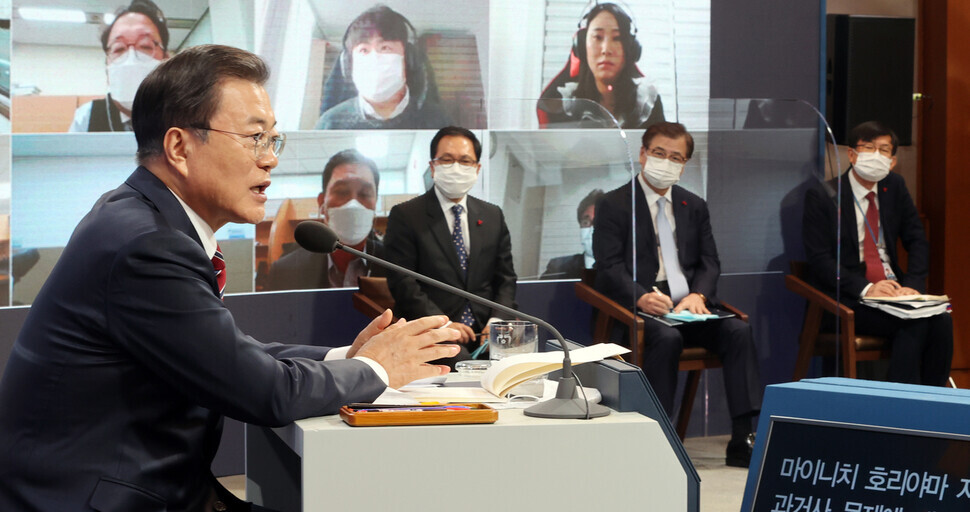hankyoreh
Links to other country sites 다른 나라 사이트 링크
Moon admits he was “a bit thrown” by court ruling on comfort women issue

President Moon Jae-in said he was “frankly a bit thrown” by a Jan. 8 court ruling that did not apply the customary international law principle of state immunity to the issue of compensation victims of wartime sexual slavery by the Japanese military.
Moon also commented on the October 2018 ruling on compensating victims of forced labor mobilization by imperial Japan, which has been the main factor behind the recent falling-out with Tokyo.
“It isn’t desirable to have an approach where [assets seized from Japanese companies] are liquidated or the ruling is achieved through compulsory execution,” he said. His remarks were seen as more clearly showing his commitment to improving ties with Japan, which has been in evidence since Prime Minister Yoshihide Suga took office in September 2020.
In a New Year’s press conference at the Blue House on Jan. 18, Moon pointed to Japan’s controls on exports to South Korea and the Supreme Court ruling on victims of forced labor as matters to be resolved between Seoul and Tokyo.
“Actually, I was frankly a bit thrown when the matter of the comfort woman judgment was added into things amid our efforts [toward a diplomatic resolution],” he confessed. This suggests that the judgment emerged as a surprise wrinkle at a time when Seoul had been seeking out diplomatic solutions in the wake of the sharp tensions during the second half of 2019 over the Supreme Court ruling on forced labor.
The administration reportedly expected that the South Korean court would dismiss the ruling out of respect for the customary international law principle of state immunity, which holds that sovereign acts by countries are not subject to trials in another country’s courts. In the case of the “comfort women” issue, compensation had already been provided to many survivors through the Reconciliation and Healing Foundation, which was established with the 1 billion yen (US$9.6 million) Tokyo paid as part of an agreement it concluded with Seoul on Dec. 28, 2015. Many of the 32 plaintiffs in the two current comfort women trials have reportedly received payments of 100 million won (US$90,590) from the foundation.
Moon already reaffirmed that any diplomatic solutions would require the “consent of the plaintiffs.”
“I believe that our two governments can discuss an approach that the plaintiffs will agree to, and that the South Korean government can work calmly to solve the issue by taking that approach to the plaintiffs and working its hardest to win them over,” he said.
The Japanese government is maintaining that the two sides’ relationship cannot be improved without a solution on the forced labor issue.
By Kim Ji-eun, staff reporter

Editorial・opinion
![[Editorial] Does Yoon think the Korean public is wrong? [Editorial] Does Yoon think the Korean public is wrong?](https://flexible.img.hani.co.kr/flexible/normal/500/300/imgdb/original/2024/0417/8517133419684774.jpg) [Editorial] Does Yoon think the Korean public is wrong?
[Editorial] Does Yoon think the Korean public is wrong?![[Editorial] As it bolsters its alliance with US, Japan must be accountable for past [Editorial] As it bolsters its alliance with US, Japan must be accountable for past](https://flexible.img.hani.co.kr/flexible/normal/500/300/imgdb/original/2024/0417/6817133413968321.jpg) [Editorial] As it bolsters its alliance with US, Japan must be accountable for past
[Editorial] As it bolsters its alliance with US, Japan must be accountable for past- [Guest essay] Amending the Constitution is Yoon’s key to leaving office in public’s good graces
- [Editorial] 10 years on, lessons of Sewol tragedy must never be forgotten
- [Column] A death blow to Korea’s prosecutor politics
- [Correspondent’s column] The US and the end of Japanese pacifism
- [Guest essay] How Korea turned its trainee doctors into monsters
- [Guest essay] As someone who helped forge Seoul-Moscow ties, their status today troubles me
- [Editorial] Koreans sent a loud and clear message to Yoon
- [Column] In Korea’s midterm elections, it’s time for accountability
Most viewed articles
- 1Samsung barricades office as unionized workers strike for better conditions
- 2[Column] The clock is ticking for Korea’s first lady
- 3[Editorial] When the choice is kids or career, Korea will never overcome birth rate woes
- 4Why Israel isn’t hitting Iran with immediate retaliation
- 5[News analysis] After elections, prosecutorial reform will likely make legislative agenda
- 6S. Korea, Japan reaffirm commitment to strengthening trilateral ties with US
- 7Japan officially says compensation of Korean forced laborers isn’t its responsibility
- 8[Editorial] As it bolsters its alliance with US, Japan must be accountable for past
- 9[Editorial] Does Yoon think the Korean public is wrong?
- 10[Guest essay] How Korea turned its trainee doctors into monsters